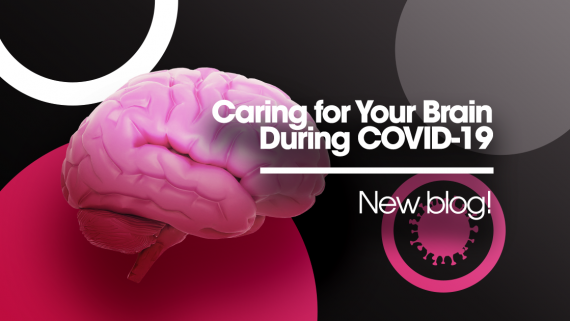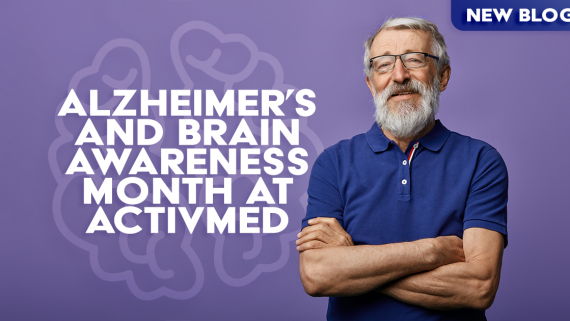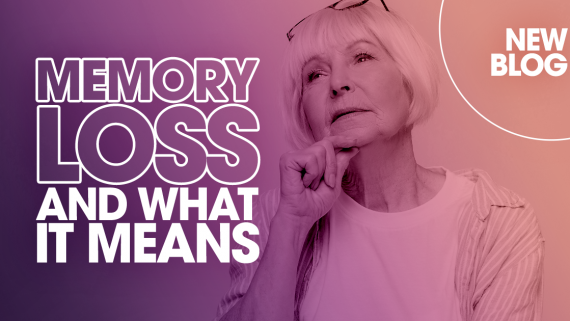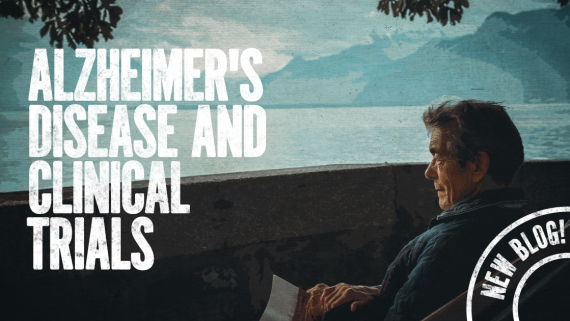Family members are the primary source of support for older adults and people with disabilities in the U.S. Nearly half of all caregivers are over age 50. The significant emotional, physical, and financial toll caregiving can take means that many are vulnerable to their own health declining. In fact, managing mental health as a family caregiver is one of the support services highlighted during National Family Caregivers Month. As we recognize and honor the contributions of caregivers, let’s make sure we take care of them, too.
Engage, Support, and Empower
This year, National Family Caregivers Month builds upon the continued resilience of the care partner community. Over the past year, caregivers have taken on added responsibility to keep themselves and their loved ones safe from COVID-19. With this ever-mounting burden, many may have forgotten to address their own mental and physical well-being.

Alzheimer’s disease is called a family disease because watching a loved one slowly decline creates chronic stress that affects everyone. Nevertheless, it’s important for caregivers to focus on their own needs, take time for their own health, and get support and respite from caregiving regularly to sustain their well-being during this journey. Emotional and practical support, counseling, resource information, and educational programs about Alzheimer’s disease help a caregiver provide the best possible care for a loved one.
You can celebrate National Family Caregivers Month by:
- Taking a free mental health assessment if you are struggling with your own mental health
- Making sure you are taking breaks to rest and enjoy the things you love
- Keeping up with your regular doctor appointments
- Sharing your caregiving story utilizing the hashtags #CaregiverAnd, #FamilyCaregiver, #Caregivers, and #NFCMonth
- Utilizing online and local resources for support
The Vital Role of Caregivers in Dementia Research
Caregivers provide many vital roles when it comes to their loved ones. They are often the first to notice changes in symptoms and behaviors, attend doctor’s visits, and are responsible for communicating with other family members. Clinical research studies offer an opportunity for caregivers to help their loved ones leave a lasting legacy that impacts future generations of individuals with Alzheimer’s or other dementia.

ActivMed Practices & Research offers FREE baseline memory screenings and Alzheimer’s disease research studies that are currently enrolling. To learn more about setting up a free screening for you or a loved one or about our enrolling studies, call (978) 655-7155 or visit our website today!
Sources:
https://acl.gov/news-and-events/downloads-and-multimedia/NFCM
https://www.caregiveraction.org/national-family-caregivers-month
https://www.census.gov/newsroom/stories/family-caregivers-month.html
Stress is a way of life these days, it seems. COVID-19 has effectively changed the way we live our lives, at least for the foreseeable future. Most of us know that stress is not good for the body, but do you know how it impacts our health? Prolonged exposure to stress changes the way our brains function. To dive deeper, it reverts to its primitive functions that help us sense and respond to danger. We become faster at solving quick issues but lose the ability to plan or deal effectively with complex problems. Stress doesn’t have to run your life. With a little basic care and healthful changes, you too can embrace the stress.

Stress Relief Tips
There is so much that is beyond our control, and the truth is that stress is ever-present. Fortunately, there are things you can learn to help manage how you react to stress and help you relax your brain.
- Meditation– Meditation can help relax your mind, and help you become less reactive to stress triggers.
- Restructure Stress Response– Cognitive restructuring is a technique that changes the habitual thinking patterns that trigger your stress response.
- Stress Management– Learning more about stress, stress management, and what triggers your stress response will help you feel more confident to handle what life throws at you.
- Confide in Someone You Trust– Talk things out with a trusted loved one instead of staying in your thoughts. Surround yourself with those who will help you identify you are stressed, and when to take action.
Brain Exercises
Taking care of your brain is important at any age. Engaging in regular brain exercises helps improve memory and focus so you can keep up with daily life. In our later years, brain changes begin to affect memory, and these activities become more and more important. Jigsaw puzzles, dancing, learning a new skill, and meditation are some ways you can challenge your mind.
June is Alzheimer’s and Brain Awareness Month. The program’s focus is on providing brain health education, resources, and tools for Alzheimer’s and other forms of dementia. One of the ways they do this is by helping to raise money for the vital research needed to detect, treat, and eventually cure these conditions through clinical research studies.

ActivMed Practices & Research can help you take charge of your brain health. You can get involved by participating in one of the Alzheimer’s research studies at our Methuen location or take advantage of our telehealth memory screens. To learn more about our free telehealth memory screens, call the Methuen office at (978) 655-7155 or by click here.
References:
https://www.sciencenews.org/article/coronavirus-covid19-stress-brain
https://www.verywellmind.com/how-to-relax-your-mind-3144475
https://www.healthline.com/health/mental-health/brain-exercises#focus
An estimated 50 million people are living with Alzheimer’s or other dementia. June is the inaugural commencement of Alzheimer’s and Brain Awareness Month. The Alzheimer’s Association states that “every person who has a brain is at risk.” This is the perfect time to act and create awareness for this expanding public health crisis. ActivMed is taking action in another way. With over 800 clinical trials completed between four free-standing facilities, our efforts are improving access to care and treatment planning.
Alzheimer’s and Brain Awareness Month

The purpose of Alzheimer’s and Brain Awareness Month is to raise awareness about the brain, Alzheimer’s, and other dementias on a global level. June also marks a time to recognize the millions suffering from Alzheimer’s and other dementias, along with the caregivers that are so essential in their care. June 20th is the summer solstice as well as the Longest Day fundraiser which raises money towards finding a cure for Alzheimer’s. Anyone can get involved, and currently, most of the activities can be modified to meet social distancing requirements.
ActivMed’s Role in Alzheimer’s Disease and Brain Health
ActivMed Practices & Research has partnerships with more than 40 physicians and six major hospitals in greater Boston and Southern New Hampshire. The company has four clinical research offices, providing access to nearly 2.5 million people. Our Lawrence location is set-up within the New England Neurological Associates, offering those with memory loss more options.
ActivMed offers free health screenings for glucose, depression, memory, blood pressure, and pulmonary.
In response to the current social distancing guidelines, ActivMed now offers telehealth memory screens. These brief cognitive assessments can provide insight into one’s cognitive abilities. Although no diagnosis is provided, it can be a tool used for early intervention in the event results warrant it. No insurance is required, and all information is kept confidential.

Since 1994, ActivMed Practices & Research, Inc. has conducted studies in the areas of Neurology, Family Medicine, Psychiatry, Dermatology, Gastroenterology, Pain, Nutraceuticals, Vaccines, Medical Devices, and more. ActivMed is also Virtual Trial Capable. Click on the links to learn more about the currently enrolling studies for Alzheimer’s at the Lawrence and Methuen locations.
References:
https://www.alz.org/abam/overview.asp
https://www.seniorlifestyle.com/resources/blog/alzheimers-brain-awareness-month/
http://act.alz.org/site/MessageViewer?em_id=156121.0
Your brain, like your body, goes through change as it ages. As a result, we may not remember things as well as we did before. It may take longer to learn something new and losing things may happen more often. Forgetfulness that goes beyond the occasionally lost keys and inability to remember a name may be a cause for concern. Although some people experience memory issues as a result of treatable conditions, Alzheimer’s-related memory loss gradually gets worse over time. Memory screenings serve as a baseline to evaluate our current memory and how it changes over time. They are also a good way to see what is typical as we age, and what is not.
Why Should I Get a Memory Screen?

It is recommended if you are 65 or older to have your memory assessed yearly; however, if your memory issues concern you at all, talk with your doctor. They can help rule out any treatable conditions or determine if further evaluation is needed for something more serious.
Alzheimer’s symptoms typically begin before people notice since mild to moderate memory issues are typical with aging. Early diagnosis of Alzheimer’s or other forms of mild cognitive impairment helps you educate yourself and your family about the disease, allowing you to begin treatments to manage symptoms.
The National Institute on Aging lists the following as some of the signs of a more serious memory issue:
- Making poor judgments and decisions a lot of the time
- Problems taking care of monthly bills
- Trouble having a conversation
- Losing track of the date or time of year
- Misplacing things often and being unable to find them
Free Memory Screening
The National Institutes of Health (NIH) is now recommending that everyone get a baseline memory screening, then a yearly follow up memory exam to look for cognitive changes.

ActivMed offers free memory screenings at their Lawrence, Methuen, and Lowell offices for anyone over the age of 50. The memory exam will determine a generalized score from the cognitive assessment—the score aids in identifying if the cognitive decline is reasonable, mild, or moderate. The results are reviewed and signed by a physician, and copies can be given to you or sent to your doctor to evaluate. You can fill out our free memory screen request form here.
References:
https://www.nia.nih.gov/health/noticing-memory-problems-what-do-next
https://www.mayoclinic.org/diseases-conditions/alzheimers-disease/in-depth/memory-loss/art-20046326
https://www.ncbi.nlm.nih.gov/pmc/articles/PMC1123445/
Despite current treatment options, there is still no cure for Alzheimer’s. Current treatment options only temporarily slow the symptoms of dementia and keep them from worsening. Finding more effective options and even a cure comes down to testing new potential treatments via clinical trials.
What is Alzheimer’s?
Alzheimer’s Disease (AD) is the most common form of dementia and is not a normal part of aging. It causes memory loss and other cognitive problems that gradually worsen over time. Eventually, every aspect of a person’s daily life is impacted when they have AD. Early stages impact memory, while later stages come with mood changes and behavioral changes. It can even affect a person’s ability to walk, speak, and swallow.
Although the majority of those affected with AD are over 65, approximately 200,000 Americans under 65 have early-onset Alzheimer’s. On average, a person lives 4-8 years after diagnosis, and up to 20 years depending on various factors. It is the 6th leading cause of death in the U.S.
Don’t Just Hope, Help.
More participants are needed in clinical trials to help evaluate potential treatment options and to find a cure. Through the clinical trial process, more effective treatments and prevention opportunities can be found.
Beta-amyloid protein and biomarker studies that explore what causes AD have provided cutting-edge treatments and led to better medical care. However, none of these advancements are possible without volunteers. Here are some of the benefits of participating in a clinical trial:
- You can help future generations
- Participation may help you get more involved in your healthcare
- You or your loved one may have access to new treatments not available to the public
Volunteers that have a family history of AD, dementia and even those with no history are all needed. The data that is gathered from your results are used to determine whether a new medication or therapy is safe and effective.
ActivMed Practices & Research, like many other research facilities, has joined the fight to cure Alzheimer’s by conducting clinical trials. If you or someone you love is diagnosed with Alzheimer’s and are interested in hearing more about our study opportunities, click HERE.
References:
https://www.alz.org/alzheimers-dementia/what-is-alzheimers
Impacting the lives of over five million people in the U.S. alone, Alzheimer’s Disease is one of the leading diagnoses in seniors over the age of 65. Nearly every household has felt the effect of this incurable condition, whether personal or in witness to the toll it has had on national celebrities, such as activist Rosa Parks or actor James Stuart.
National Alzheimer’s Disease Awareness Month celebrates the families and fighters of Alzheimer’s, promotes a hopeful future and search for a cure.

When was National Alzheimer’s Disease Awareness Month founded?
Preceding his diagnosis in 1994, President Ronald Reagan signed Proclamation 5110 in November 1983, establishing that month as National Alzheimer’s Disease Awareness Month to recognize the condition as a serious concern to the growing U.S. population. Since that time, this awareness month has been utilized to encourage research, community support and education of memory loss and Alzheimer’s symptoms.
How is Alzheimer’s Disease diagnosed?
If someone begins to experience or display significant memory loss symptoms, physician may use several methods to determine whether or not that individual has some form of dementia.
First, a physician may conduct an overall health and memory screening. A memory screening is a series of tasks and questions used to test memory, cognition, language skills and other intellectual functions. The doctor can use this information over a span of time to measure cognition and gauge mental condition.
Standard medical tests, including blood and urine testing, in addition to brain scans, such as MRI or CAT scans, can also be used to rule out other symptoms, such as stroke or the presence of a tumor.
What are the symptoms of Alzheimer’s Disease?
According to Mayo Clinic, there are five primary symptoms of Alzheimer’s Disease:
- Memory loss or lapse
- Difficulty with concentration
- Difficulty with decision making and reasoning
- Inability to perform routine tasks (such as cooking or getting dressed)
- Changes in personality (including mood swings, social withdrawals, apathy and distrust in others)
How can I participate in National Alzheimer’s Disease Awareness Month?
Across the nation, there are many opportunities to be involved and raise awareness for Alzheimer’s Disease. Awareness walks, 5K races, charity events and volunteerism are just a few options on how you can become involved in your community. Physicians at ActivMed also offer free memory screenings by appointment, at no cost to you nor is insurance needed.
If you or someone you know has experienced memory loss, or has been diagnosed with Alzheimer’s disease, you may also be eligible to participate in clinical research! Qualified candidates will receive study-related care and medication at no cost, as well as receive compensation for travel. To learn more on how you can be involved, CLICK HERE.
Most people experience more moments than they can recall. From our first steps to dinner last night, we often have difficulty remembering all of the details from each day. Fortunately, the mind subconsciously stores many of these special moments as memories to be triggered by or associated with specific environmental factors for later recollection.
With each unique memory being more precious than the last, memory loss can be a frustrating experience to endure; however, cutting-edge research may provide new treatment opportunities and hope for patients diagnosed with mild cognitive impairment.

First, what is mild cognitive impairment?
According to Mayo Clinic, memory loss, or mild cognitive impairment, is the stage between expected cognitive decline and aging, and the more serious decline of dementia. This condition affects over 20% of the U.S. population over the age of 65, and can often be the early onset of other cognitive diseases, such Alzheimer’s disease.
How is memory loss treated?
Since Dr. Alois Alzheimer first linked microscopic brain formations to memory loss in 1906, scientists have been searching for new, more effective ways to treat patients suffering from cognitive impairment. Due to the complicated nature of the condition, it wasn’t until the mid-1990’s that treatment options first emerged, with the FDA approval of a drug called tacrine (Cognex).
Based on information from the Alzheimer’s Association, there are two primary types of medication assigned to treat cognitive impairment symptoms: cholinesterase inhibitors and memantine. Cholinesterase inhibitors are prescribed to treat early to moderate stage memory loss or Alzheimer’s disease by helping prevent the breakdown of chemicals messengers used to stimulate learning and memory, while memantine is used to treat severe Alzheimer’s disease to improve daily function and information processing.

Is there a cure for memory loss and dementia?
Unfortunately, there is no known cure for these conditions. Physicians at ActivMed are looking to change this reality by continually seeking new treatment options for patients diagnosed with mild cognitive impairment. If you or someone you know has experienced memory loss, or has been diagnosed with Alzheimer’s disease, you may be eligible to participate in clinical research! Qualified candidates who decide to participate will receive study-related visits and lab work at no cost, as well as receive compensation for travel. To learn more on how you can be involved, CLICK HERE.









